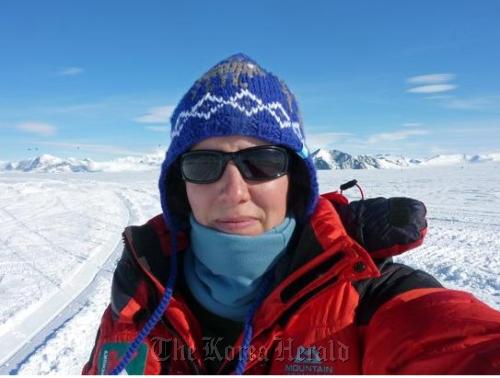Tears, joy as woman sets Antarctic crossing record
By Korea HeraldPublished : Jan. 24, 2012 - 19:18

BUENOS AIRES, Argentina (AP) ― British adventurer Felicity Aston became the first woman to ski alone across Antarctica on Monday, hauling two sledges around crevasses and over mountains into endless headwinds, past the South Pole and onward to the coastal ice shelf, persevering for 59 days in near-total solitude.
She made it to her destination ahead of schedule, using nothing but her own strength to cover 1,744 kilometers from her starting point on the Leverett Glacier on Nov. 25 to Hercules Inlet.
The most surprising thing about her journey, she said, was how emotional it proved to be, from the moment she was dropped off alone, through every victory and defeat along the way.
“I’m not a particularly weepy person, and yet anyone who has been following my tweets can see me bursting into tears,” she said in an interview with the Associated Press on Monday while waiting for a plane to pick her up.
“When I saw the coastal mountains that marked my end point for the first time, I literally just stopped in my tracks and bawled my eyes out,” she added. “All these days I thought there was no chance I was going to make it in time to make that last flight off Antarctica, and yet here I am with three days to spare.”
Aston also set another record: the first human to ski solo, across Antarctica, using only her own muscles. A male-female team earlier skied across Antarctica without kites or machines, but Aston is the first to do this alone.
Aston, 34, grew up in Kent, England, and studied physics and meteorology. A veteran of expeditions in subzero environments, she worked for the British weather service at a base in Antarctica and has led teams on ski trips in the Antarctic, the Arctic and Greenland.
But this was the first time she traveled so far, so alone, and she said the solitude posed her biggest challenge. In such an extreme environment, the smallest mistakes can prove treacherous. Alone with one’s thoughts, the mind can play tricks. Polar adventurers usually take care to watch their teammates for signs of hypothermia, which is easier to diagnose in others than yourself, she said.
She thought she was done for when her two butane lighters failed high in the Transantarctic Mountains, where it got “really very cold.’’
“Suddenly I realized that without a lighter working, I can’t light my stove, I can’t melt snow to make water, and I won’t have any water to drink, and that becomes a very serious problem,” she said.
She made it to her destination ahead of schedule, using nothing but her own strength to cover 1,744 kilometers from her starting point on the Leverett Glacier on Nov. 25 to Hercules Inlet.
The most surprising thing about her journey, she said, was how emotional it proved to be, from the moment she was dropped off alone, through every victory and defeat along the way.
“I’m not a particularly weepy person, and yet anyone who has been following my tweets can see me bursting into tears,” she said in an interview with the Associated Press on Monday while waiting for a plane to pick her up.
“When I saw the coastal mountains that marked my end point for the first time, I literally just stopped in my tracks and bawled my eyes out,” she added. “All these days I thought there was no chance I was going to make it in time to make that last flight off Antarctica, and yet here I am with three days to spare.”
Aston also set another record: the first human to ski solo, across Antarctica, using only her own muscles. A male-female team earlier skied across Antarctica without kites or machines, but Aston is the first to do this alone.
Aston, 34, grew up in Kent, England, and studied physics and meteorology. A veteran of expeditions in subzero environments, she worked for the British weather service at a base in Antarctica and has led teams on ski trips in the Antarctic, the Arctic and Greenland.
But this was the first time she traveled so far, so alone, and she said the solitude posed her biggest challenge. In such an extreme environment, the smallest mistakes can prove treacherous. Alone with one’s thoughts, the mind can play tricks. Polar adventurers usually take care to watch their teammates for signs of hypothermia, which is easier to diagnose in others than yourself, she said.
She thought she was done for when her two butane lighters failed high in the Transantarctic Mountains, where it got “really very cold.’’
“Suddenly I realized that without a lighter working, I can’t light my stove, I can’t melt snow to make water, and I won’t have any water to drink, and that becomes a very serious problem,” she said.
-
Articles by Korea Herald










![[Robert J. Fouser] Social attitudes toward language proficiency](http://res.heraldm.com/phpwas/restmb_idxmake.php?idx=644&simg=/content/image/2024/05/16/20240516050799_0.jpg&u=)
![[Graphic News] How much do Korean adults read?](http://res.heraldm.com/phpwas/restmb_idxmake.php?idx=644&simg=/content/image/2024/05/16/20240516050803_0.gif&u=)






![[Herald Interview] Byun Yo-han's 'unlikable' character is result of calculated acting](http://res.heraldm.com/phpwas/restmb_idxmake.php?idx=652&simg=/content/image/2024/05/16/20240516050855_0.jpg&u=)
